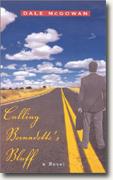Calling Bernadette's Bluff
Dale McGowan
book reviews:
· general fiction
· chick lit/romance
· sci-fi/fantasy
· graphic novels
· nonfiction
· audio books
· author interviews
· children's books @
curledupkids.com
· DVD reviews @
curledupdvd.com
newsletter
win books
buy online
links
home
for authors
& publishers
for reviewers

 |
Calling Bernadette's Bluff Dale McGowan XLibris Paperback 365 pages January 2002 |
|
Dale McGowan's Calling Bernadette's Bluff is an undoubted triumph of academic satire. Set on the campus of a Catholic women's college in a small Minnesota town, it reveals and revels in the foibles and antics of a singular yet familiar set of characters, leaving neither faculty nor administrators nor staff nor students unscathed by its biting wit. But Bernadette's Bluff is also a delightful, insightful investigation into the heart of faith of a different kind, of the universal human need for a belief system, of the search for truth and meaning and a life lived honestly.
When his old college chum and partner in disbelief Scott Siberell shows up at St. Bernie's in the collar of a Catholic priest and his ex-wife announces that she intends to send their brilliant little boy to a Lutheran school, Jack's indignance boils over. First with baby steps, then with longer strides, Jack starts to "come out" to his colleagues and the college in an attempt to return to a truthfully-lived life. But his efforts roll quickly out of his control like a midwinter snowball across the hockey pitch atop the mysterious geographical formation of Bernadette's Bluff. Between his old friend's grandiose plan to change the world from his new bully pulpit and the Native American protesters blocking construction of a tunnel under the wedge and Dean Martin's increasingly frenzied and furtive attempts to erase apparitions of Holy Mother Mary across campus, the College of St. Bernadette and Jack Kassel will be forever altered by a conflagration the likes of which no one is prepared for. There's something about the Midwest that makes a comic academic novel set there so piquant, and author Dale McGowan mines that rich vein of sincere absurdity for all it's worth in this mightily funny sendup of faith and letters. Characters and campus buildings alike share titteringly amusing names like Nurse Chapel (the campus church), Monty Hall (English & Languages), Marilyn Sherwood-Forrest (a shameless namebuilder in her choices of mates), and, of course, Dean Martin. The nutty behavior of strident feminist faculty, of the fruity, New Age-y college president, of the cowed and careful male instructors are gratifyingly laughable. Set in perfect counterpoint and collusion to this high hilarity is McGowan's earnest underlying theme of the necessity of examined beliefs. He peppers the text with references to Hume and Huxley, and opens chapters with bell-tone quotes that shine a spotlight on the story -- and the reader's assumptions -- from a different angle, one from which something we always thought we saw clearly becomes something bigger, more mysterious. Calling Bernadette's Bluff is in excellent company with other satirical novels of academe; from David Lodge to Jane Smiley, from Malcolm Bradbury to James Hynes, Dale McGowan is easily their match in wit and depth. If there's more where this came from, McGowan's future looks bright (and examined) indeed.
|
|
|
|
 Click here to learn more about this month's sponsor! |
|
| fiction · sf/f · comic books · nonfiction · audio newsletter · free book contest · buy books online review index · links · · authors & publishers reviewers |
|
| site by ELBO Computing Resources, Inc. | |
 Twelve years at the militantly feminist, hyperreligious College of St. Bernadette have left secular humanist philosophy professor Jack Kassel in a state of intellectual, professional and moral torpor. Hiding his unbelieving light under a bushel to keep it from the hawk's eye of Dean Genevieve Martin and unable to find another philosophy gig anywhere, Jack no longer even sees his students as people but as blurry, amorphous "shapes" who seem incapable of thinking beyond the rigid confines of the faith of their fathers.
Twelve years at the militantly feminist, hyperreligious College of St. Bernadette have left secular humanist philosophy professor Jack Kassel in a state of intellectual, professional and moral torpor. Hiding his unbelieving light under a bushel to keep it from the hawk's eye of Dean Genevieve Martin and unable to find another philosophy gig anywhere, Jack no longer even sees his students as people but as blurry, amorphous "shapes" who seem incapable of thinking beyond the rigid confines of the faith of their fathers.